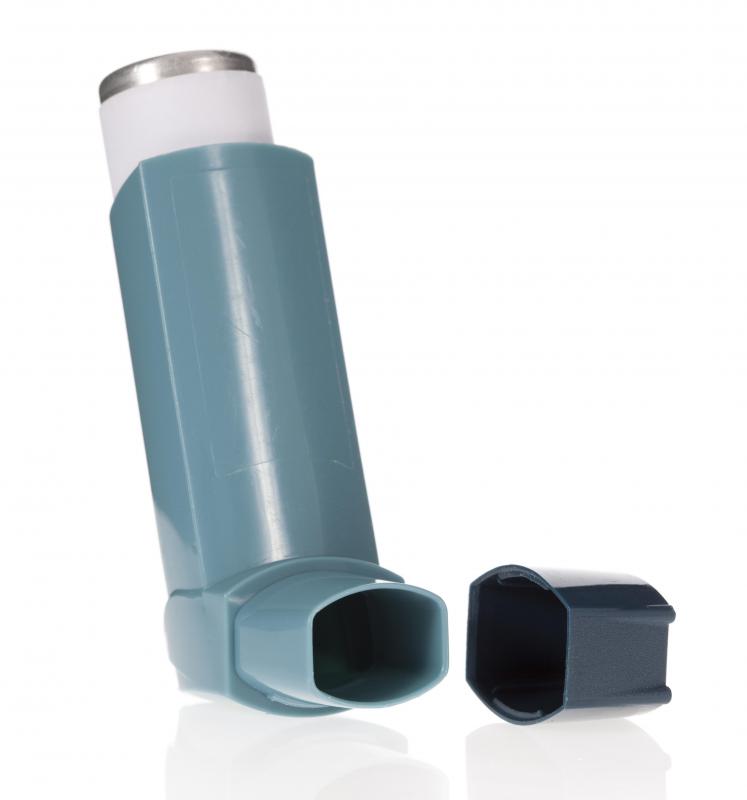At WiseGEEK, we're committed to delivering accurate, trustworthy information. Our expert-authored content is rigorously fact-checked and sourced from credible authorities. Discover how we uphold the highest standards in providing you with reliable knowledge.
What is Stress Hyperglycemia?
Stress hyperglycemia is a high blood glucose condition which can occur during another, often unrelated, illness. In many cases, it develops while a person is hospitalized or under intense treatment for other conditions. Stress hyperglycemia is characterized by an increase in blood glucose levels and is sometimes referred to as stress diabetes.
Certain treatments, such as those for asthma emergencies, create a higher risk for stress hyperglycemia. Other illnesses create an imbalance in a person’s ability to process insulin or create a hypersensitivity to insulin, thus resulting in stress hyperglycemia. It is rare for this condition to need direct treatment, as it most often will go away once the person is no longer sick. Stress hyperglycemia, however, is sometimes a concern because it may signal a predisposition or onset of diabetes mellitus.

While stress hyperglycemia often occurs in people who have not had high blood sugar problems in the past, high blood glucose may quickly become dangerous. It can significantly increase a person's risk of kidney failure, heart attack, and other potentially life-threatening problems. Although stress hyperglycemia usually resolves on its own, care must be taken to avoid these complications. The longer the patient is hospitalized and the more serious his condition, the higher the overall risks.

Illness stress is a main contributing factor to stress hyperglycemia, but medications given to patients in hospital intensive care situations may increase the risk. Carefully monitoring blood glucose can reduce a patient's risk of developing it, as can beginning treatment immediately if it does occur. Hyperglycemia may become dangerous if left undetected for too long. Those with this condition and extended illness may wish to seek treatment rather than wait for the condition to correct itself.

The most common forms used for diagnosis are plasma glucose tests and the glucose meter test. A plasma test provides the most accurate results. Insulin therapy is a favored course of treatment, but it may lead to other complications in some patients. Hypoglycemia, or low blood glucose levels, is one complication which may result from insulin therapy that is too aggressive. Depending on the nature and severity of his illness, this can lead to further complications or even death.

Common safety precautions taken to prevent unnecessary complications are assessing patients' glucose levels as early as possible when they are hospitalized or in medical settings and continuing to monitor them throughout hospital stays. It is also useful to know the person's prior history, in terms of whether he has experienced stress hyperglycemia in the past or has genetic factors that may increase his risk. Any patient who is critically ill or recovering from serious surgery is generally monitored repeatedly for changes in glucose levels.
AS FEATURED ON:
AS FEATURED ON:

















Discussion Comments
My doctor once used the term "stress hyperglycemia" during a visit. He noticed my blood sugar levels were high, but my blood tests didn't show any major problems with my pancreas or insulin production. My high blood sugar was the only type two diabetes symptom I had. He asked me about my job and family situation, and I told him I had a fairly stressful job as a kitchen manager, and my wife and I had been having some problems lately.
He started me on several prescription medications use in type 2 diabetes treatments, but he stopped short of diagnosing me as a type 2 diabetic. He wanted me to find ways to deal with my personal stress and take these blood sugar lowering medications religiously for three months. He'd then do an A1C test to get an average blood sugar level for that three month period. If it was back in the normal range, I most likely had stress hyperglycemia, not diabetes mellitus.
I didn't realize it had a name, but I think I may be suffering from stress hyperglycemia. My diabetic wife once tested my blood glucose level with her meter and it was significantly higher than normal. My first thought was that I must have type two diabetes, but I didn't have most of the signs and symptoms of diabetes.
I still haven't been officially diagnosed with diabetes mellitus, but my blood glucose levels tend to run high, especially when I'm under a lot of stress at work. I can get a little control over my blood sugar levels through diet and exercise, but it will still spike at different times. I think I may try some anti-stress exercises like meditation or tai chi and see if the numbers change.
Post your comments